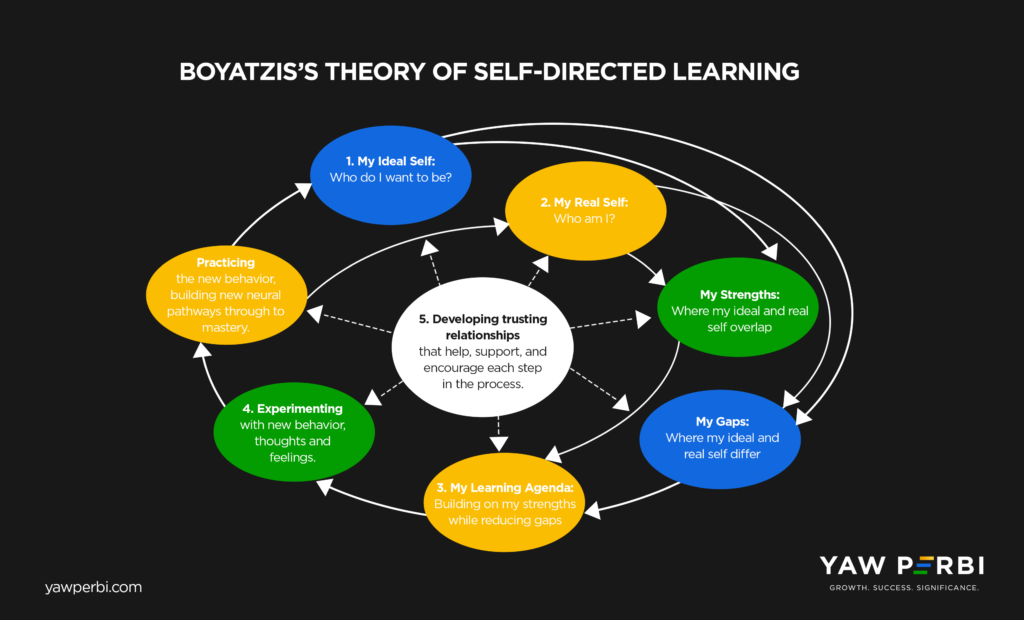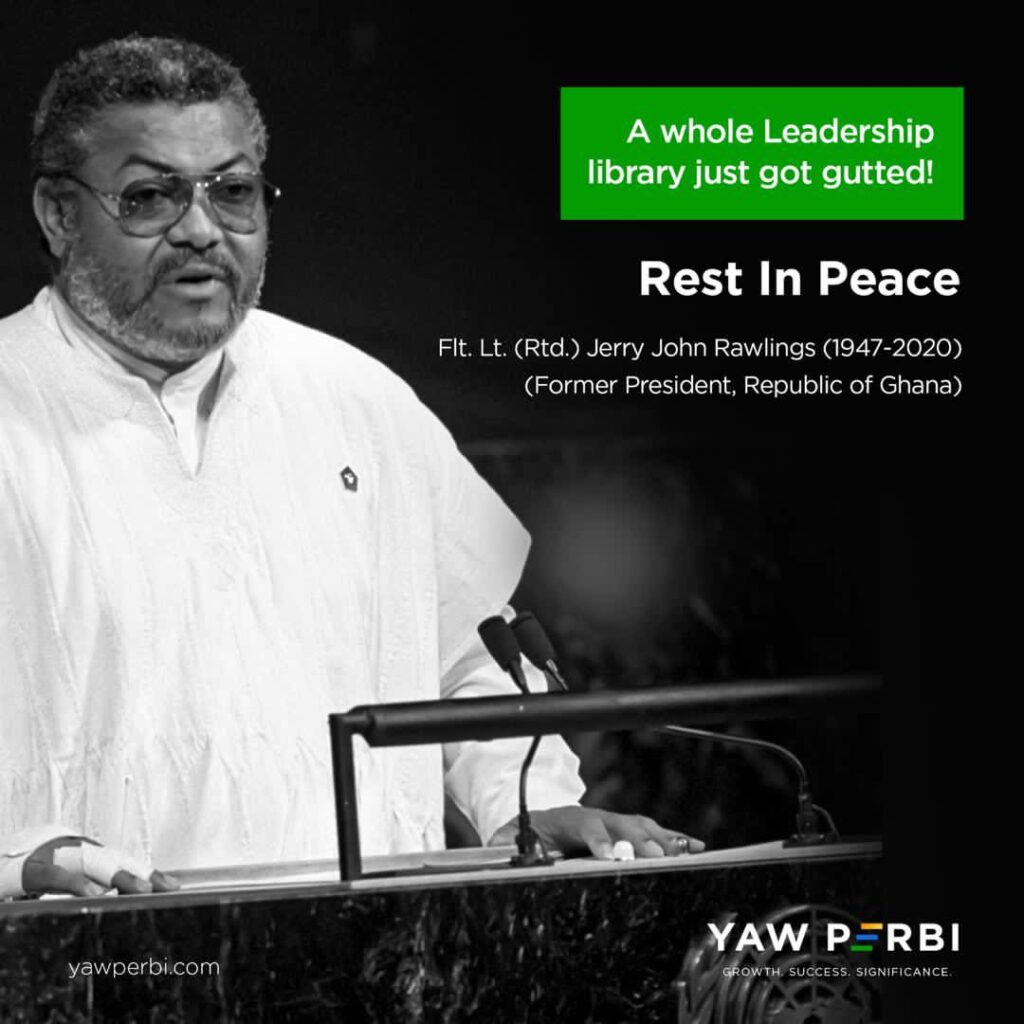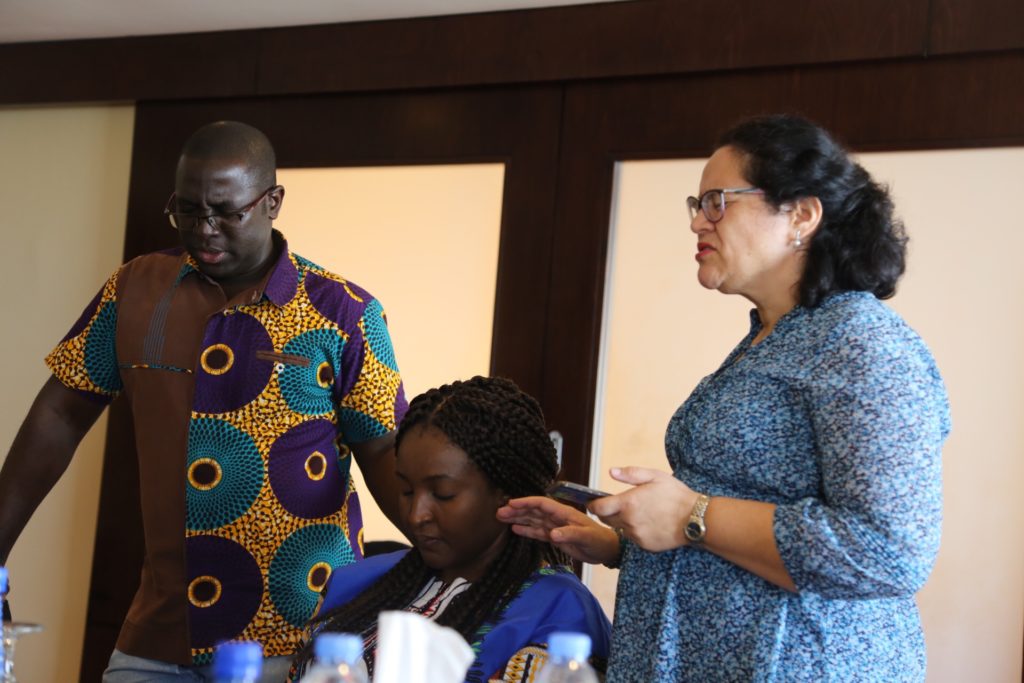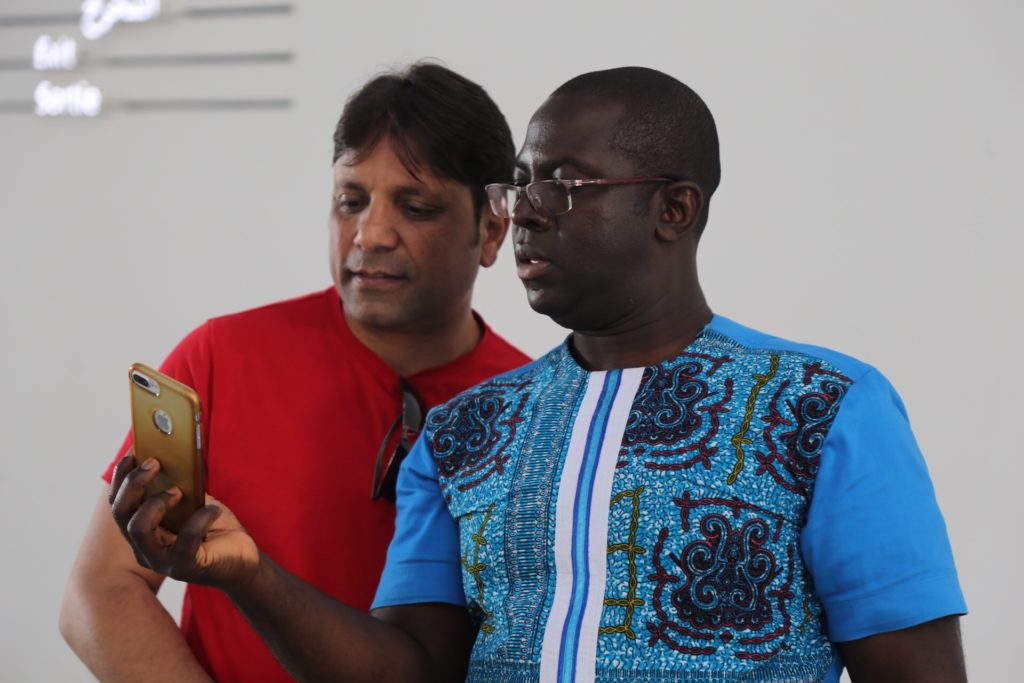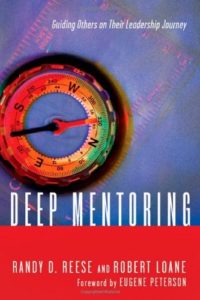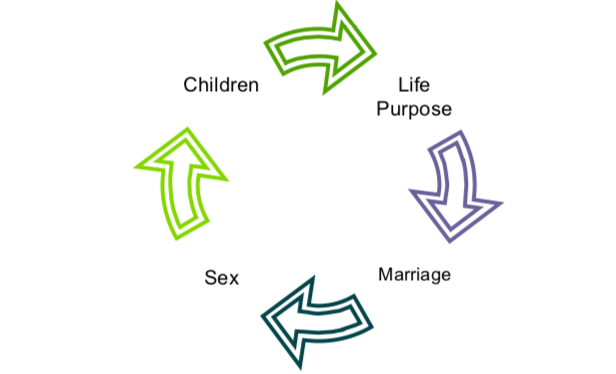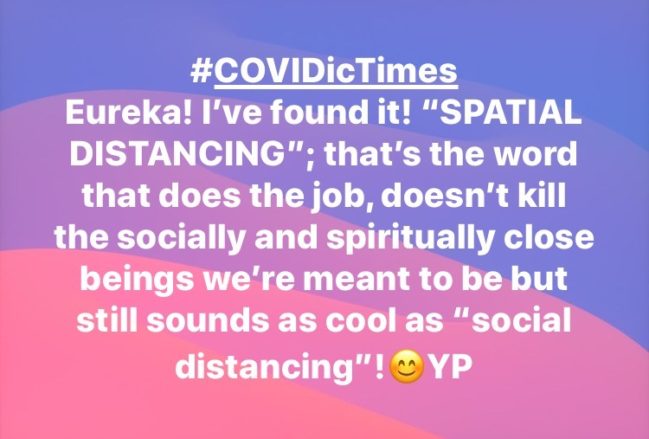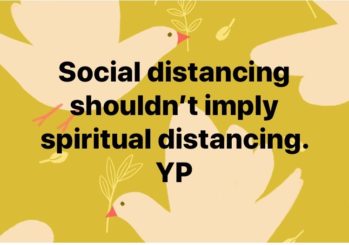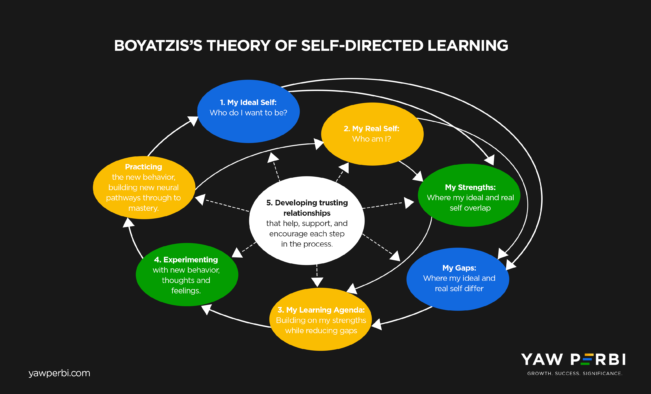
GET COACHED | How does it work?
“Your journey to leadership is likely to take many unexpected turns. Life is full of challenging situations, including ethical dilemmas, midcourse career changes or burnout, seemingly intractable interpersonal challenges, marriage and family issues, failures, and loneliness. At times, you may feel you are losing your way or have gotten off course from your True North. Getting back on track alone is very difficult, perhaps even impossible” (Bill George). That’s why you need a coach.
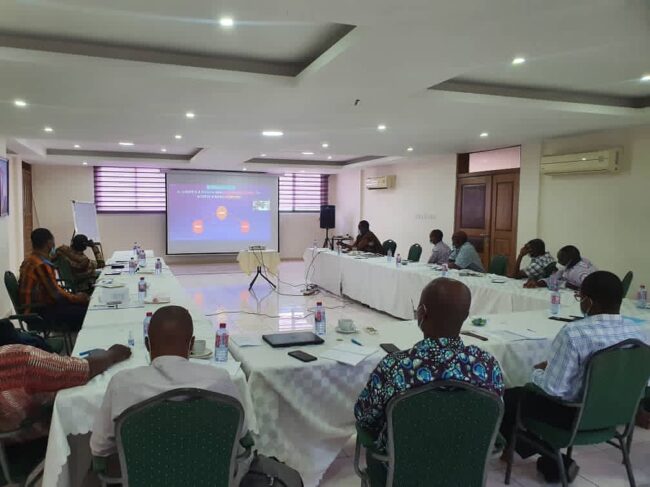
A group of Medical Superintendents in Ghana viewing a live YAW PERBI presentation on Emotional Intelligence via Zoom
If you’ve followed me on social media over the last few days you should’ve noticed a couple of posts about my excitement to train a group of Medical Superintendents in Ghana on Emotional Intelligence (EQ). Of course everybody needs (EQ) but one reason doctors in particular do is that they tend to think because they are smart and got into med school they would be successful in life and leadership. To our rude shock (and I say ‘our’ because I am a doctor myself), after a certain threshold, intelligence (IQ) doesn’t matter anymore, and what gives the winning edge to succeed is all EQ.
NO ONE CAN HELP THEMSELVES WITHOUT BEING HELPED
After an hour of training on what EQ is, five reasons why it’s key and how to acquire it, I left them with Boyatzis’s theory of self-directed learning. I first encountered this during my read of Primal Leadership, a book he co-authored with the chap who most popularized EQ from 1995 till date, Daniel Goleman. Boyatzis’s map (see below) begins with a hopeful “Who do I want to be?”, a picture of your ideal self. This existential question is at the very apex of Maslow’s hierarchy of needs (if you remember); it is a question of self-actualization. But the next question, which in my opinion really should be the first, is ‘Who am I?’, your real self.
Integrating those two questions reveals one’s strengths (where your ideal and real self overlap) and your gaps (where your ideal and real self differ). Your learning agenda or growth plan, therefore, basically involves building on your strengths while reducing your gaps. And so you begin: experimenting with new thoughts (head), feelings (heart) and behaviours (hands). Practicing your new behaviours actually results in building new neural pathways to success/mastery.
But here is the kicker: Central to all of these points, steps, and pathways is “DEVELOPING TRUSTING RELATIONSHIPS that help, support and encourage each step in the process.” Again, that’s where a professional coach comes in. Even in this so-called ‘self-directed’ learning, no man is an island and needs the vital trusted relationships to make their growth and goals happen.
COACHING MOMENT
Do you have someone that will tell you the truth and to whom you can tell the truth? Do you have the authentic relationships and customized resources to clarify your beliefs and values and understand vital personal and professional issues and receive honest feedback when you need it most?
A coach’s responsibility is to provide content, insight, tools, wisdom, framework, ideas, and feedback. YOUR responsibility is to move from awareness to action and accountability. Our coaching provides many structures for you to meet your individual and organizational goals.
For John Maxwell certified coaches like myself, whether it’s one-on-one executive coaching or one-on-few, we like to say that the objectives of coaching include, but are not limited to:
- Discovery of personal identity, emotional needs, purpose (vision & mission) and values
- Crafting of personal, professional and corporate Growth Plan
- Adding an objective and supportive third party to your leadership team
- Increasing accountability of your personal and professional goals
- Improving specific skills related to your role. Such as managerial skills, communication, conflict resolution, time management, productivity, and effectiveness
- Sharing best practices from other organizations that have done similar work
- Reviewing strategic business decisions related to operations, customer service, marketing, financials, and more
- Being a sounding board
- Preventing problems, thereby avoiding expensive, time consuming or embarrassing actions
- Supporting your growth past your limiting beliefs
- Conflict resolution
- Creating a team atmosphere
- Relationship development for success and significance.
COACHING OPTIONS (FOR C-LEVEL EXECUTIVES, OWNERS & GENERAL MANAGERS)
Coaching Categories: Depending on your goals and budget, at YAW PERBI we offer Green, Blue and Gold level coaching. Currently only Gold services are available, and they are limited.
Time & Place: All coaching programs require a minimum time investment of 6-12 months. Coaching is a marathon, rather than a sprint! Depending on whether Green, Blue or Gold level, the coaching package includes 2, 3 or 4 sessions a month lasting approximately 60-90 minutes. Sessions can be at your office, my place of business, or a mutually agreed upon location. In these days of COVID-19, online coaching is our mainstay via Zoom. Phone coaching is also an option but I prefer to see the individual to observe body language and such.
Special arrangements: Sometimes included in a gold package is two full days of shadowing, facilitation of a two meetings of your choice (up to 2 hours each), and unlimited phone calls and emails in between sessions. In addition, you or any of your employees will benefit from a 25% discount for any company training/workshops.
Other coaching services: Group Coaching, Sales Coaching, Couples Coaching, Business Partner Coaching, Youth Coaching, Relationship Coaching, Genogram Coaching and more (they include these but not limited to them).
Payment arrangements: These are to be made before services are provided, and as agreed upon via this website, mobile money, PayPal, cheques or bank transfers.
Miscellaneous: We will always be punctual. If you need to reschedule, 24 hours advance notice is required or one-half of the coaching session is lost. If for some reason I need to reschedule and do not do so with a 24-hour notice, you will be credited with an additional one-half coaching session, at no additional charge. Our coaching relationship is completely confidential. We will never share your identity or any information about you with any other person or organization without your expressed consent. In the unlikely event that there are concerns that need to be referred to another professional, I may be able to make that suggestion to you.
Completing our coaching relationship is a mutual decision. While my retention percentage is very high, there may come a time when you determine that it is time to complete our coaching relationship. If and when that time comes, I expect that the coachee will give me at least four weeks’ notice. That will give us time to summarize your growth/learning and strategize your next steps.
Our services are unconditionally guaranteed. If at any time you feel that you are not getting the support, honesty, coaching, or training that you expect, then you need to tell me.
LET’S GO!
If you are serious about growth, success and significance you need a coach. The proof of your commitment is your investment of quality time, best effort and substantial money. Even as a coach, I also have a paid coach. Everybody needs somebody to coach them. So! Make arrangements here and now for a 30-minute exploratory call to see if we would be a good match.
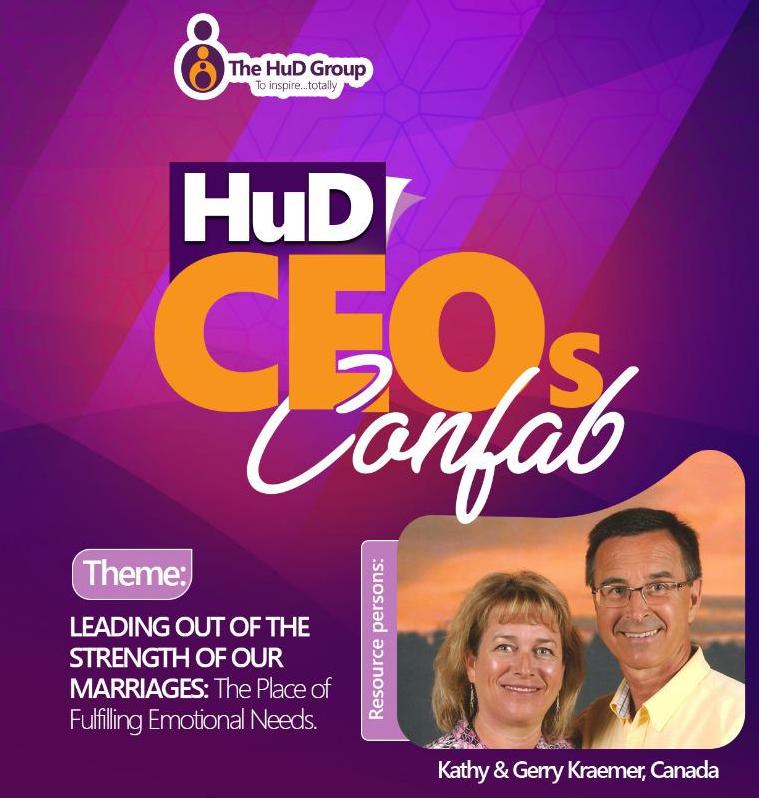
A Global Gathering: the blessing in the curse.
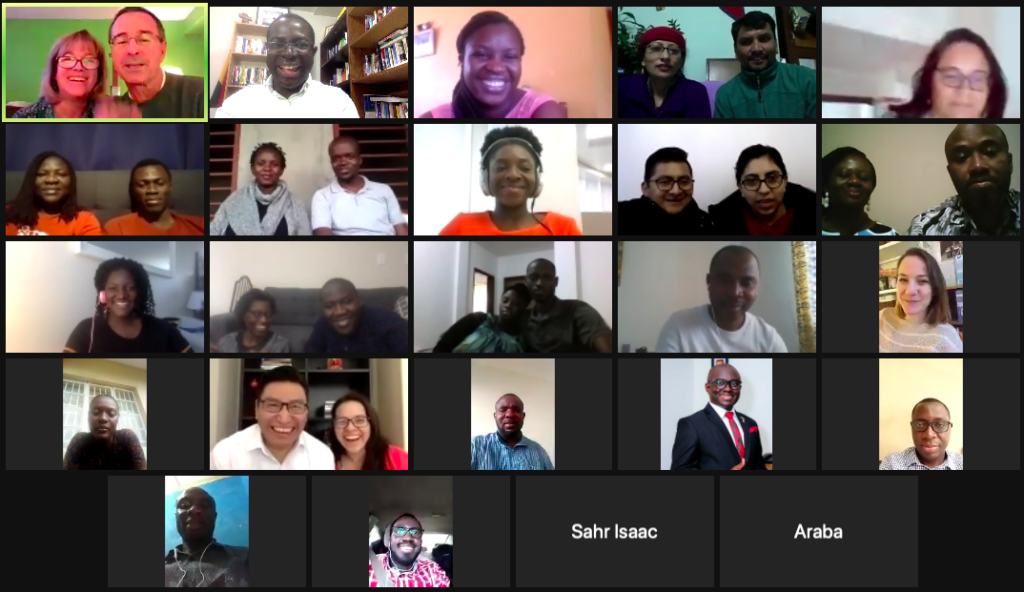
Leaders from over a dozen countries on all six continents gathering online for an annual CEOs Confab
As you already might know I am the Global CEO of The HuD Group, a faith-based leader development organization that originated from Ghana but now has presence in over 20 countries of the world, on all six continents.
For the last four years, every November we have hosted a HuD CEOs Confab. In 2016 we had two separate CEO gatherings in Accra, Ghana and Montreal, Canada. This was followed by the 2017 Confab in Alexandria and Cairo in Egypt. In 2018 we were in Dubai. Last year, 2019, we met in Abidjan and Bouake, in the Francophone West African nation of La Cote d’Ivoire. In 2020 we had planned a special Confab with our spouses and were supposed to be in Israel but here we are, thanks to COVID-19!
Today was Day 1 of our annual Confab. We met on Zoom. The blessing of that though is that nearly EVERYONE was able to show up (with most spouses present) because there was no hustle getting time off regular work, no financial or ticketing challenges and above all no visa headaches!
Thanks to modern technology, amidst a global pandemic we joined the call from eastern and western Canada, USA, Nepal, Switzerland, Uganda, Ghana, Mexico, Germany, The Gambia, Cote d’Ivoire, Sierra Leone, Kenya, Guatemala, Somalia and Australia. A few of us should join from Nigeria, Liberia, Pakistan and Colombia in the coming days, DV.
Our theme is “LEADING OUT OF THE STRENGTH OF OUR MARRIAGES: The Place of Fulfilling Emotional Needs” and we have an AMAZING Canadian couple to lead us into that.
THE KRAEMER ICING ON THE CAKE
Gerry and Kathy both grew up in Western Canada where they committed their lives to Jesus Christ as Saviour and Lord during their adolescent years. Immediately after marrying in 1981, God called them in a clear and dramatic fashion to serve Him in the French-speaking province of Quebec, Canada. Ever since, they have been in full-time Christian ministry together, including five years with Campus Crusade for Christ (evangelism and discipleship), 22 years of pastoral ministry and six years as the chaplain of the Montreal Alouettes professional football team.
In 2007, “the gates of hell” unleashed a serious of attacks on the Kraemer’s marriage and they plummeted to the brink of divorce. In the summer of 2008, during a week of intensive counselling with Larry & Lorrie Russell at the SHM Retreat Center in Ontario, Canada, God completely healed, restored and transformed their marriage. Upon returning home, they immediately began to share the amazing story of the miracle of the “resurrection of their marriage” to individuals and groups in their entourage…and God used their story to touch, encourage and heal marriages around them.
The opportunities continued to increase so dramatically that they resigned from their pastoral position in the fall of 2010 in order to dedicate themselves to a full-time ministry of speaking (prevention) and counselling (crisis intervention) to help couples. Today, they speak and teach together at conferences, Bible Camps, retreats, banquets and Bible Schools in both English and French, sharing with thousands of people the tools that can help them experience a healthy and flourishing marriage. Their honesty, practicality and humor make them easy to listen to and the wisdom of their teaching is hard to forget.
Gerry and Kathy reside in Terrebonne, Quebec and they are the parents of three young adults: Timothy, Jessica and Rebecca. In their spare time they enjoy golf, tennis, traveling and spoiling their grandchildren both in Canada and the USA!
CONCLUSION
Wow! What a big blessing amidst the Covid curse. Oh! And today happens to be U.S. Thanksgiving. Happy Thanksgiving!
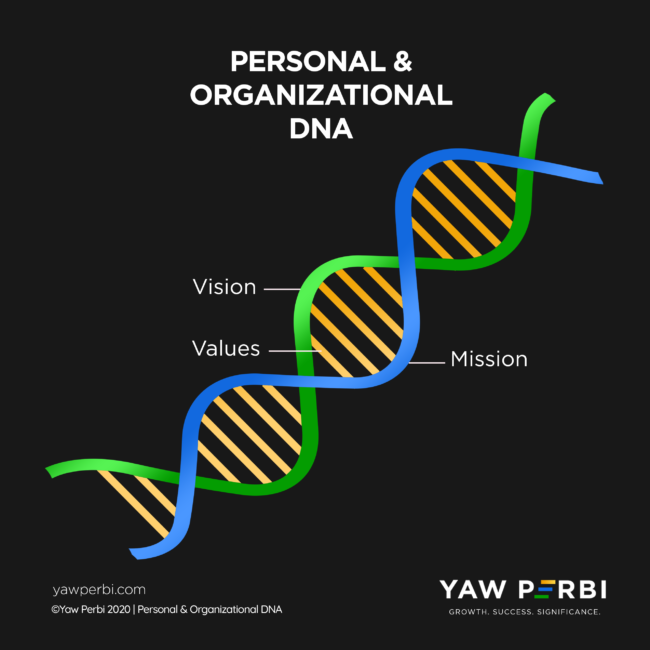
Personal and Corporate DNA: Vision, Mission and Values
Your vision, mission and values constitute your DNA, personal and corporate. Here’s why and how.

Vision, mission and values are really the life-giving and life-forming essence of persons and organizations
Whether one-on-one executive coaching or one-on-few, an exercise that energizes me most is getting into personal/corporate vision, mission and values. Once, I was invited to be a keynote speaker at an organization whose founder and CEO I greatly admire and respect. After the plane ride and having rested up, I got to their premises and looked round their impressive corporate building (no mortgage; all already paid for). I couldn’t help noticing the huge murals that spelt out the organization’s vision and mission. They were literally bill boards all over the walls trying to spell out why they existed and what they sort to accomplish.
Then I began to be concerned as what had been stated as their vision looked like what should be the mission and the mission was… well, let’s just say I was concerned. How was I to bring this up to the ‘big man’ without offending him too much, especially knowing how vital vision, mission and values are in giving life and forming persons and organizations? Without a deep and urgent intervention regarding the writings on the wall, I was afraid the writing was on the wall.
SOME CORPORATE SCIENCE
Permit the doctor in me to explain some fundamentals about DNA. DNA is the material that carries all the information about how a living thing will look and function. Each piece of information is carried on a different section of the DNA. These sections are called genes. DNA is short for deoxyribonucleic acid. It is in every cell of every living thing, even your fingernails! DNA is tiny but consequential; scientists need to use very powerful microscopes to see them. DNA has a complex structure but basically looks like a ladder that is twisted into a spiral. Each piece of DNA has two long strands (like the sides of a ladder). The two strands are joined together by chemical bases that form the rungs of the ladder.
Person and organizations are living things also. Vision, mission and values are the stuff that carry all the information about how they will look and function, survive and thrive. Vision and mission are akin to the two helical strands of DNA and values are the pieces that hold both sides together like the rungs of a ladder. This is the biochemistry of corporations.
Do you know that what determines how you look (eg. colour and texture of your hair, colour of your eyes and skin), how your lungs work, your blood type etc. are all determined by DNA? There are about 3 billion pairs of the chemical bases on the strands that connect with the other strand. The order in which the bases are arranged is very important. It forms a code that tells cells to make certain kinds of proteins. The differences in these proteins is what makes different living things—such as a plant, a panther, and two different people—different. You and I are different as persons, so are Unilever and Microsoft, or F.C. Barcelona and Manchester United, based on DNAs. Arsenal’s DNA codes for redness and Chelsea’s for blueness.
When DNA works correctly, it helps keep the body functioning properly. DNA helps cells to make proteins, which the cells need to live. DNA also allows living things to reproduce. The genes in DNA pass along physical traits from parents to children. Sometimes there are mistakes in DNA. These mistakes are called mutations. They can cause diseases and other problems.
INTERVENTION
Here are two disturbing observations I’ve made regarding vision, mission and values. One is the peer pressure of having them because just because ‘everyone else does’ and it’s in vogue. This pressure to look good because you have a mission statement on your office wall has gone even to the extent that people even look at those of companies or persons they admire and just blindly copy them as their own! Imagine my body copying your body’s DNA! The other disturbing observation is that people have no idea which is which (particularly vision and mission) and have them all over the place! If you need personal or corporate coaching to get this right, please do! This is vital. Vision, mission and values are really the life-giving, life-forming and life-replicating essence of persons and organizations.
VISION & MISSION
Vision is literally what we want to SEE. It is about Being. Think of it as a noun. Mission is what we want to DO to see what we want to see. It is about Doing. Think of it as a verb.
So for example, my vision for this executive education company YAW PERBI is to see a flourishing global ecosystem of authentic leaders characterized by healthy growth, holistic success and lasting significance. Consequently, our mission is to offer authentic and customized relationships and resources to C-level executives to grow personally, succeed professionally and become significant corporately.
Another family company that is into library services for children is known as Perbi Cubs. That company has a different DNA from YAW PERBI, though both entities bear the name Perbi and have some things in common. The DNA of Perbi Cubs is different because its vision, mission and values are different. The vision of Perbi Cubs is to see EVERY African family successful as a product of an enlightening culture of leisure reading. And what are they doing to see what they want to see a.k.a mission? To deliver an evidence-based, literacy-promoting endeavour to an engaged community of families hungry to know more so they can be more, do better and succeed.
Yet another family business, Trenor Coats & Gowns Ltd., has had a vision since its founding in 2009 to be a leader in the textiles care industry in West Africa. The mission is to provide customers with world-class textile care services driven by state-of-the-art facilities, trained and dedicated employees, and superior customer services.
By now you’ve had enough to chew on regarding the double DNA helix of vision and mission. I’ll save the rungs of the DNA, values, for a later blog.
AT THE END OF THE DAY
Individuals and organizations ought to make the time to clearly hone out their clear vision, passionate mission and compelling values. This is a fundamental function of leadership. The help of a coach or consultant is highly recommended. It must be done right. I strongly advise individuals to make sure that their personal DNA aligns with the corporate DNA of whatever organization they work for/with (or seek to work for/with). DNA is life. No DNA, no life; bad DNA, bad life–be it personal or corporate. Choose life!

I’m Serving Up: Here’s How.
Like leadership, there are umpteen definitions of culture. My favourite is the simplest. Culture, whether ethnic or corporate, is simply the way things are done here. How things are seen to be done at YAW PERBI is determined, like Apple or Android, by our unseen Operating System (OS). That OS or worldview feeds our beliefs, informs our values, which in turn determine our behaviour.
As we carry out our vision and mission, here are our 7 YP values and what they mean:
1. People. We value people: People come first; not stuff. People are the only creation that bear the imago Dei (image of God). That should mean something; everything.
a. We are aware that without people we are nothing.
b. We value relationships and foster community.
c. We grow people, clarifying their identity, giving them purpose, unearthing gifts, nourishing persons to flourish.
d. We pride in, promote and protect family.
e. We offer high care to our clientele, with a great deal of empathy.
f. Our exceptional client experience leaves them feeling wonderfully valued.
2. Growth. We value growth: We grow or die. There’s no middle way.
a. We invest in ourselves and invest in others’ growth; continually.
b. We are sworn to lifelong learning in a diverse community till we die.
c. We strive to be knowledgeable and enlightened in order to succeed.
d. We expect pain to be associated with grown and have made peace with the fact.
3. Particularity. We value particularity: One size doesn’t fit all. Each client is different and has a unique life story and makeup.
a. We see and treat each person reverently, as wonderfully made.
b. We invest in getting to know our clients’ life stories, identity, purpose, and SHAPE.
c. We honour the above (a & b) by customizing our offerings.
d. We provide tools to discover and affirm uniqueness of each client and match them to the appropriate relationships and resources.
e. We pride in and promote the prestige of the executive class.
4. Excellence. We value excellence: We go above and beyond.
a. We exceed expectations as a habit.
b. We work hard and play hard.
c. We take our word and commitments seriously.
d. We do not compromise on quality–it is a virtue.
e. We do anything that is worth doing, well.
5. Success. We value success: We are passionate about all-round prosperity.
a. We are committed to the progressive realization of worthy goals and ideals; our clients’ goals are ours.
b. We inspire and motivate ourselves and our clientele to see and seize their dreams.
c. We long for holistic success.
d. We are victory connoisseurs.
6. Authenticity. We value authenticity: No fake folks or fake news, no fake products or services.
a. We lead, coach, author, speak and train with integrity.
b. We are truthful about ourselves and our offerings.
c. We can be trusted.
d. Our ways and means are proven to produce desired results. What we promote works.
e. We are in public who we are in private.
f. We are holistic in thinking and living, in our being and doing.
g. We strive to live and lead such that those who know us and love us the best (family and friends) respect us the most.
7. Significance. We value significance: We live to ‘make a dent in the universe’.
a. We look outward, beyond ourselves.
b. We work towards things that benefit communities, nations and generations.
c. We are inspired by the thought that our best works will outlive us.
d. We bear in mind that only what is done for God’s glory by God’s grace will last.
WHAT’S COOKING & HOW WE’RE SERVING
So now, you don’t only know our menu–the vision and mission–you also know the manner in which we plan to dish it all out. I’m serving up. Take a seat.
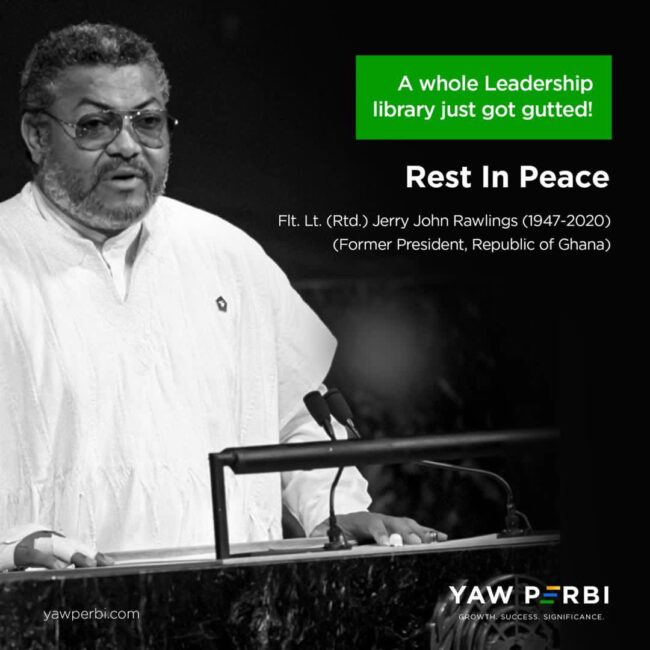
Oh, J J and the “Revolution”
While I hope Ghana’s former president Jerry John Rawlings does Rest In Peace, his passing has evoked many memories and a slew of strong sentiments–the good, the bad and the ugly. My father was Chief Accountant of the Social Security Bank at the time of J.J.’s ‘revolution.’ I have often touted my dad’s integrity. Here’s one of his recent reflections on how his integrity and God’s grace saved his skin during the days of the ‘revolution’, quite literally.
After the apparent unfinished business in 1979, JJ came back onto the public scene by ousting President Hilla Limann on 31st December, 1981. The mindset was people were corrupt; more corrupt than the public acknowledged, and far more widespread.
Soldiers entered our premises where we were staying, at a place called Pig Farm, in Accra. Word must have gone somewhere that our landlady Mame Boatema was hoarding cloth. Her trade was selling cloth at Makola, and there was a concept called “ hoarding”: some sellers used to keep some of the items for sale away from public view, partly in order to create shortages and hence sell what they had at higher prices, and partly, on a much lower scale, in order to pass them on to their favorite patrons and customers. It did not matter whether the things in your possession were legitimately acquired by you or not; if the quantity constituted more than a certain perceived number, you were branded as hoarding, and you suffered consequences. Consequences; various consequences, from outright seizure of the items, to sometimes seizure plus beatings.
On this evening, we had closed from the office and were home when all of a sudden soldiers entered our house. We were then occupying the lower floor of a two-storey building, Mame Boatema the wife of the landlord occupying the top floor. Apparently the soldiers had climbed up, done their search, found nothing and upon descending opened our front door without knocking and entered. Ma gave them a questioning look; I signaled to her to keep calm. They went to every room, found nothing of what they suspected, and left.
When they left, Mame Boatema went to the entrance of the house and shouted to all who were in hearing range, and somehow addressed to neighbours across the road whom she suspected may have sent false information to the soldiers that she was hoarding cloth, how disgraceful they had turned out to be, seeing that nothing untoward was found in the search.
That was just one domestic scenario. There were several in several places, many receiving beatings etc. Soldiers were all over the place, with an agenda they only knew, but mainly looking for “ enemies of the revolution”: namely people who were profiteering.
I was then chief accountant of the Bank ( SSB), one of the departments under my purview being the Stores. SSB was a very popular bank those days. It had been set up by the late Dr Appiah as a subsidiary of the national pension institution SSNIT, and was intended to help fill some identified gaps in the banking industry. Its department called Consumer Credit Department specifically set up to offer workers loans to buy consumables – fridges, freezers, cookers etc- was very popular with workers. The inflation in the country was not only in double digits but also the changes were so rapid that workers were no longer able to source loans easily to buy their needs. Members of staff felt very much appreciated by members of the public- and apparently also envied and hated by some – notably those who could not access the credit for one reason or the other.
Another aspect of SSB’s uniqueness was its opening of cocoa branches. These were new branches at cocoa farming and buying centres to assist cocoa farmers offer their cocoa sales receipts to the Bank for cash/credit. Prior to this, hard-working cocoa farmers after harvesting and selling their cocoa would only be given sales receipts which they had to hang on for very long periods of time and at the mercy of the traditional banks which were not many to start with, nor operating in thick rural areas. This made the Bank also very much appreciated by cocoa farmers.
In addition to this, warehousing finance whereby importers of goods, usually consumables, could access funds from the Bank usually to finance customs and clearing charges of imports by depositing the products in the Bank’s warehouse and have them released in bits based on how they were selling the items and paying the credit in installments was a very welcome initiative in banking.
The Bank’s warehouse was located at the North Industrial Area in Accra, while the Head Office where my office was was at Kokomlemle. On this occasion, I was told that soldiers had gone to the Warehouse and beaten one of the storekeepers. I wondered why, but almost immediately added “ If he did not do anything wrong, would they beat him? Maybe they asked to open the gates for them to see what was inside and he refused.” Little did I know that I was soon to eat back my own words later that night: being beaten before being heard.
People mingled around the frontage of the Bank wondering what was going on; it was near closing time, and I had also closed and joined the rest of the staff in wonder. Before long a military vehicle Pinz Gauer pulled up and with a couple of soldiers and policemen at the back drove up to the front of the Bank. While we were all at a loss as to what was up, I noticed I was pointed out and signaled to approach the vehicle. A soldier asked whether I would be able to answer some questions on the items in the warehouse and I confidently said “Yes.” I was asked to climb into the vehicle.
It was obvious it was most probable I was not going to drive home myself in my car that evening so I gave my car keys to one of the staff I identified and climbed in. We drove off, not knowing where they were taking me. We first went to a base near 37 Military Hospital, sat in the vehicle, wondering what was next. After a long time, and with dusk well settled and darkness in the atmosphere, we drove on, me little knowing where the destination was.
While going, some of the soldiers and policemen were exposed their beef as they expressed their disappointment with not being able to get some of the consumer items when they applied. I kept quiet, not being the manager in charge of that credit, but also being very much aware that no amount of defence would assuage their bitterness and anger.
Soon we were to turn into Burma Camp, and deeper into what I later got to know was Gondar Barracks. “Meat come! meat come!” were shouts that greeted us from soldiers at the camp, and apparently a couple or so other Pinz Guarers already parked ahead of us. “Meat,” as in reference to people who had been sent to the barracks who would be beaten. The prospect of beating civilians was being likened to enjoying some beef or similar juicy meat. I saw soldiers lifting their boots into the bodies of people, including their groins and any other part of the body they could reach with their legs.
Sooner or later it came to my turn. There was an office not far from the road where the vehicle had parked. When I was called, or rather signaled to enter the office, I descended from the vehicle and I heard one of them ask me to remove my eye glasses. Before I knew what was happening, two hefty slaps landed on my cheeks from behind me. I tried to make my way to the office, somehow convinced that there would be some respite there. It was like fighting unknown and unseen forces. While I tried hard to force my way to the office, I felt being restrained with some bearing. Eventually I made my way to the office.
An officer seated at a table asked of my designation . When I told him, it turned out that I was not one they were looking for. They asked me to go back to sit in the vehicle to be driven back. While waiting in the vehicle, some of the soldiers who had become somewhat apologetic said some people had even lost their lives so … apparently to console me that my fate could have been worse. When we departed to be sent to 37 area to find our way home, I opted to get off as soon as we exited the Burma Camp, and fortunately found a taxi that took me home to Pig Farm. Those were days of curfew: no one was expected to be on the streets from 6 pm to 6 am, later to be adjusted to 9 pm to 6 am.
A member of my staff Aggrey Fynn, himself a retired naval officer who was Stores Manager had also been sent to the barracks. I could only pray as to how he was going to be treated. Nursing pains in the cheeks the next few days and a red eye seemed a small price to pay for what was in store for the country, unknown to many, including even those who appeared to be “ in charge.”
Bank forgeries three years later and how some civilians were shot to death and my escape from it is another story altogether.
Reindorf B. Perbi
17 November, 2020
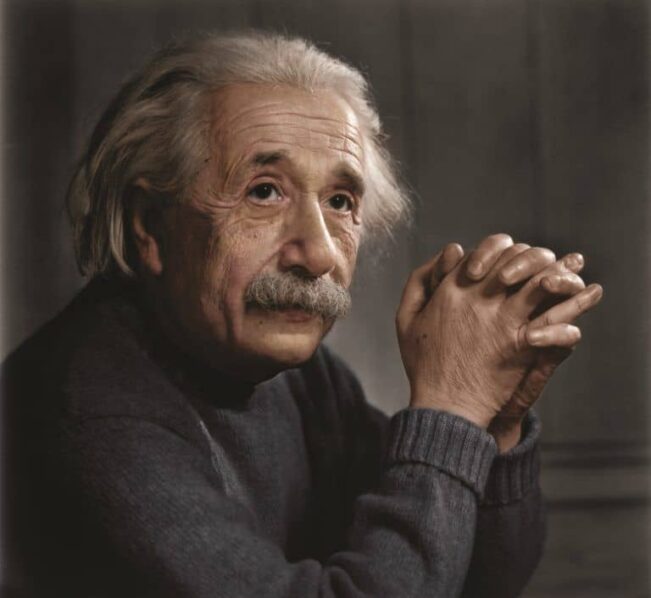
Disrespecting Einstein | A note to HR bosses

Nobel Prize Laureate Albert Einstein (14 March 1879 – 18 April 1955) Photo credit: Perimeter Institute
Exactly a week ago, I finished two days of consulting for a flourishing company in Accra that was making two new hires. It wasn’t the first time I was coaching them through the hiring process and chairing the interview panel but this time there was an HR consultant who was excellent in putting everything together, literally setting the table for us all. Meticulous chap who knows his stuff! Because of a five-hour time difference between Montreal (where I’m currently based) and Accra, the 9.30am interview start on Zoom meant 4.30am for me. Well, whatever!
Everyone interviewed was a young, hope-filled university graduate, some as freshly minted as last year. I could tell the hope in their hearts and could see the fire in their eyes to ‘make it,’ here first and in the rest of life, of course! And in fact, they weren’t asking for too much. As usual, not everyone made it. Out of eight interviewees (and this was after whittling down several applications and getting the short-listed ones to fill out pre-interview questionnaires) we had room for just two.
POST MORTEM
Now here’s the kicker: the HR consultant’s drafted letter to this group who couldn’t be hired went like this:
Dear Candidate, many thanks for your patience and continuous interest in the role of __________ at __________. After thorough consideration, we are sorry to inform you that you were not successful. We take this opportunity to wish you well in all your future endeavours.
No. I couldn’t let that pass–precisely because of that phrase have made bold above for emphasis. Words matter. So I asked him, politely, if we could put “you were not successful” in a different way, in a more positive manner? Eg. “Another candidate was preferred?” And that is what we did.
Even the CEO was touched by this. She responded, “Thanks so much for the feed back Dr Perbi. True. We are working with real people’s emotions and lives.” She then went on to recount something I had done in a previous search for a C-level executive for the same company. She wrote, “ I remember the special messages you sent to each one of the candidates who did not make it, accompanied by a summary of their performance [so they could improve, work on themselves] and a prayer for them during the previous selection process. I was touched and l believe most of them appreciated the gesture.” Indeed they had felt so valued and encouraged, some wrote back to say thank you! It almost didn’t matter that they had not been picked for the role. With that buoyancy, I bet they went on to be and do great things elsewhere.
DISRESPECTING EINSTEN
From time immemorial leaders have misjudged the capabilities and potentials of others; sometimes in an outrightly comical fashion (only on hindsight, of course!) When in 1898 Albert Einstein applied for admittance to the Munich Technical Institute he was rejected because (read this slowly) he would “never amount to much.” Consequently, instead of going to school he went to find work at the Swiss Patent Office where he was employed as an inspector and with his extra time, refined his theory of relativity. As they say, the rest is history.
MY POINT?
Ask yourself: how would I act differently if I knew for sure this was an Einstein sitting in front of me? People are not just human ‘resources’, like cogs in a wheel. They are human beings. They have emotions, identity and purpose. Each bears the imago Dei (the image of God) and in the phraseology of Büber, must be treated as a ‘Thou’; not an ‘It.’ If for nothing at all, in respect for their Creator and in honour of their boldness to apply, to step into the ring, to do something with their lives. You certainly don’t want to meet them somewhere else in life and be ashamed of what you thought of them, how you spoke to them or handled them. They might even be in a position to hire or fire you someday. You may very well be disrespecting Einstein.
Lead Different.
There are many commonalities between leadership in general and Christian leadership in particular. There are stark, even diametrically opposed, differences too. The primary source of power to influence is one of them; and it is everything!
My heart skipped a beat. Jerry, who has had enough of Christian leadership nonsense of late, was passionately shaming some unnamed pastors for preaching from Robert Greene’s 1998 bestseller The 48 Laws of Power. I began to wonder: were these pastors comparing and contrasting Greene’s ‘laws’ with biblical principles of leadership and telling Christ followers “not so with you” or were they actually promoting the former?
I own a copy of the said book, one of over 1.2 million copies sold in the United States alone and translated into 24 languages. Fast Company called the book a “mega cult classic.” You see, I have been a student of leadership for some 20 years, informally, semi-formally and formally. In fact, just this weekend I received in the mail my official Master of Arts in Global Leadership certificate from Fuller Theological Seminary after a transformational three-year journey.
My bookshelves are loaded with all sorts of leadership books: the good, the bad and the ugly. I search for principles, those timeless, universal laws that are true for any people in any sphere of life in every age. So in Physics, for example, the law of gravity holds true wherever you are irrespective of gender, race, religion, creed or social status. Similarly, there are leadership principles that are timeless and universal truths like the laws of influence, the requirement of vision and mission (picture of the future, destination, direction, objective, goals) and absolute need for clear communication.
“NOT SO WITH YOU”
These things just listed, if we were to draw a Venn diagram of A. General leadership and B. Christian leadership, will be found in the area of intersection (AB) as illustrated below.
Having said that, there are things that are characteristic of General leadership that cannot be true of Christian leadership and vice-versa. For example Greene’s Law 15 is “Crush your enemy totally” (2002, 57); “But I [Jesus] say, love your enemies! Pray for those who persecute you!” (Matthew 5:44) When I think of the guy who falsely accused me of assault and wasted my time, energy and $15,000 in legal fees there is no doubt I prefer Greene’s Law 15; leading Christ’s way is hard.
Jesus Christ himself minced no words that some things are different in His Kingdom. He once said about power, when Mrs. Zebedee came to lobby for his two sons James and John to hold key positions in His Kingdom: “You know that the rulers in this world lord it over their people, and officials flaunt their authority over those under them. But among you it will be different. Whoever wants to be a leader among you must be your servant, and whoever wants to be first among you must become your slave. For even the Son of Man came not to be served but to serve others and to give his life as a ransom for many” (Matthew 20:25-28, NLT, emphasis mine).
THREE POWER BASES
“But among you it will be different.” It cannot be clearer than that: there are exclusives when it comes to Christian leadership and Christ followers shouldn’t fool themselves. Bobby Clinton’s extensive leadership research resulted in the observation that a person’s influence has three different sources or what he calls “power bases” which refers to “the source of credibility, power differentials, or resources which enables a leader to have authority to exercise influence on a follower” (2001, 439). The three different kinds of power bases are positional, personal and spiritual.
1. POSITIONAL POWER–this is influence exercised because of one’s position or title in society or an organization. It is extrinsic and only works because it has been granted by those with even greater authority eg. CEO appointed by a Board. People may submit because of hierarchy; but not because they have really granted the leader permission to influence them beyond that context. In his New York Times bestseller, The 5 Levels of Leadership, John C. Maxwell is unequivocal that “position is the lowest level of leadership–the entry level. The only influence a positional leader has is that which comes with the job title. People follow because they have to” (20011, 7, emphasis mine). This is is Level 1, ground floor. I worry when Christian leaders jostle for positions like bishop and archbishop and will kill over titles like ‘Rev. Dr.,’ ‘Very Rev.,’ ‘Major Prophet’ and ‘Apostle General.’ Christian leaders should examine their motives and check their shadows (a.k.a. false self) why they crave these positions and titles. The recent rush for cheap doctorates is a disgrace to Christ’s church! It is a sign of deep sickness which needs strong medicine. Only the true and pure Gospel fully applied by the power of the Holy Spirit can cure this.
2. PERSONAL POWER–this is influence exercised through a person’s mix of personality, charisma, connections, knowledge, character, skills, expertise, access to info, networth and behaviour. This is the bread and butter of the multi-million motivational industry. It’s mostly about increasing personal power. In summary, “this kind of power depends on the confidence and trust a person generates from the people he or she is attempting to lead” (Reese & Loane 2012, 116). Here, people grant you permission to lead them because of who you are, what you do (or have done), what you represent and how much you mean to them. So Maxwell’s Level 2 is Permission, Level 3 Production, Level 4 People Development and Level 5 Pinnacle (which is developing other leaders to Level 4). While all these elements of personal power are somewhat more intrinsic than positional leadership, and that may be the ceiling for the rest of the world, for the Christian leader even this will not suffice. I find many Christian leaders trying to better themselves and polish their craft to gain more influence. This is better than just positions and titles and hierarchy; but it still isn’t best. Even Maxwell’s Level 5 which he calls ‘the Pinnacle’ isn’t really the highest point for Christian leaders.
3. SPIRITUAL POWER–finally, this is influence exercised because of the perception of the person’s spiritual authority. Again, according to Reese & Loane, “The followers recognize evidence of a close relationship with God and see the leader as credible and trustworthy because of his or her apparent close relationship with God” (2012, 116). I find it curious that words like ‘perception’ and ‘apparent’ are used because people can fake this or even go for a false version of spiritual power from the occult. Again, the numerous emerging testimonies of ‘pastors’ going for occult powers to influence people is heart-breaking. It is pure evil; anti Christ. Effectual Christian leaders, whose being and doing counts on earth and in heaven, value spiritual authority as their primary power base. Again Reese & Loane say, “And this spiritual authority flows out of a deep concern for and commitment to intimacy with God and a life lived with integrity. Their influence does not exclude personal or positional authority, but these power bases become secondary. Over time, their communities increasingly recognize their lives as characterized by spiritual power and authority.” (2012, 116). We have a problem, a big problem, when Christian leaders and pastors depend more on positional and personal power than spiritual power.
CONCLUSION
It is no wonder then that “the people who know their God shall be strong, and carry out great exploits“ (Daniel 11:32b, KJV, emphasis mine), including resisting the smooth talking of those who oppose Christ and His cause. They have spiritual power, and that is everything. Not everything leadership is great or even good for the Christian leader. O for prudence, wisdom and discernment to value what counts in Christ’s marking scheme! For the Christian leader, positional power is good. Personal power is better. “Every good and perfect gift is from above.” But the greatest and best is spiritual power.
References
Clinton, Robert J. 2001. Clinton’s Biblical Leadership Commentary Series, Commentary CD vol. 2. Altadena, CA: Barnabas.
Greene, Robert and Joost Elffers. 2002. The 48 Laws of Power. London: Profile Books.
Maxwell, John C. 2011. The 5 Levels of Leadership. New York, NY: Hachette Book Group.
Reese, Randy D. & Robert Loane. 2012. Deep Mentoring: Guiding Others on Their Leadership Journey. Downers Grove, IL: InterVarsity Press.
DEEP MENTORING | A 2020 focus; a lifetime pursuit.
In an April 15, 2020 memo to members, alumni, associates and partners of The HuD Group worldwide through the various country CEOs, the Global CEO bared his heart out regarding a paradigm and practice that is direly needed: deep mentoring.
“So deeply do we care for you that we are determined to share with you not only the gospel of God but also our own selves, because you have become very dear to us.” (1 Thessalonians 2:8, NRSV)
“He [Jesus] appointed twelve that they might be with him and that he might send them out to preach.” (Mark 3:14, NIV)
BY NOW YOU SHOULD KNOW | If you didn’t, now you do.
COVID-19 or not, it is a function of leadership to cast and recast vision—clearly, creatively, constantly. But I dare say particularly in COVIDic times like these, it is suicidal not to cast and recast vision. Every year, The HuD Group runs with a throbbing vision, a focal theme for the season: 2017 (Family First), 2018 (Leading with Health of Soul), 2019 (Pursuing God’s Will Together). In 2020 our focus is Deep Mentoring.
By God’s grace I just finished (in December 2019) a three-year journey resulting in a Master of Arts degree in Global Leadership. One of the key mentors at the institution I studied at, Dr. Bobby Clinton (joined in 1982), after diving into thousands of historical, biblical and contemporary case studies came to a “startling conclusion—few leaders finish well” (Clinton & Stanley 1992, 11). Bad news. The good news, after further studies, showed that of the few who finish well, “other individuals helped most of these men and women in timely situations along the way” (11). But you know the best part? If you’re reading this there’s great hope that you will run your life and leadership well and finish strong because The HuD Group is committed to mentoring; not just mentoring, deep mentoring.
WHAT ON EARTH IS MENTORING? | One of the most used yet least understood words in our generation.
Simply put, mentoring is “a relational experience through which one person empowers another by sharing God-given resources” (12). Christian mentoring, in particular, is “a dynamic, intentional relationship of trust in which a mentor enables a mentee to maximize the grace of God in his or her life through the Holy Spirit, in service of God’s kingdom purposes, by sharing their life, experience and resources” (Lawrence 2004, 207).We have the rest of the year, indeed the rest of our lives, to learn about these different resources and the different types of mentors there are but suffice it to say it is deep mentoring that really matters.
By deep mentoring, we speak of a departure from what Eugene Peterson (writer of The Message version of the Bible) describes as a past half-a-century trend where “leadership … has been functionalized and depersonalized into programs that have steadily eroded the very core of the Christian life, which ought to be a life of trinitarian-shaped intimacy and community” (Reese & Loane 2012, 7, emphasis mine). He says this as part of the foreword to a book, ‘Deep Mentoring,’ which is our main study text alongside the immutable, living and active text of the Bible. While programmes, seminars, courses, workshops, books, videos etc. are all helpful in our discipleship and leadership formation, the essence of deep mentoring is “a leadership of companionship and a spirituality of relationship” (8).
The ultimate example of this is Jesus Christ himself who “appointed twelve that they might be with him and that he might send them out to preach” (Mark 3:14, NIV). A distant second will be the apostle Paul. In our other 2020 Deep Mentoring theme text, can you sense the depth of the relational experience the apostle had with the Thessalonians? “So deeply do we care for you that we are determined to share with you not only the gospel of God but also our own selves, because you have become very dear to us” (1 Thessalonians 2:8, NRSV).
Only deeply transformed people are able to deeply transform the church and the world, by God. I see too many, far too many, untransformed people trying to champion change in the church and/or society. You know too well the names and faces of the countless casualties. People want to ‘microwave’ leaders into being and produce them en mass. It doesn’t work that way—if there ever was a ‘superman’ who could do that it was Jesus yet even he did not because “paying attention to the formation of others is a lifelong work, which holds in tension our growing with our serving—our followership [discipleship] with our leadership” (16, emphasis mine). I am convinced, like the authors of our core textbook for the year, that “leadership development in Jesus’ name is a slow and deep work” (16). We had better get going then—slowly but surely.
CONCLUSION | So what are you going to do about it?
Choose to intentionally journey with your various national HuD Group leaders and their designates poco a poco, day by day, here a little there a little over the course of this whole year (and even another 2-3 years) and see what difference deep mentoring makes in your life and leadership for the sake of God’s kingdom coming more fully on earth, as it is in Heaven!
So help us God! Amen!
References
Clinton, Robert J. & Paul D. Stanley. 1992. Connecting: The Mentoring Relationships You Need to Succeed in Life. Colorado Springs, CO: NavPress.
Lawrence, James. 2004. Growing Leaders: Cultivating Discipleship for Yourself and Others. Peabody, MA: Hendrickson Publishers.
Reese, Randy D. & Robert Loane. 2012. Deep Mentoring: Guiding Others on Their Leadership Journey. Downers Grove, IL: InterVarsity Press.
COVIDic Times: We really don’t like children that much! | Part 2/3
So what is the paradigm shift we need, a totally different worldview, in order for us to embrace and love children as the ‘blessing’ that they are supposed to be? Those who are too smart to have/raise children will actually soon not be here anymore–and there will be little evidence that they were even ever here. But does this all even matter?
So because children are an inconvenience, suckers, an unwelcome reflection of our marred selves and a host of other pains, many postmodern people would rather have dogs and cats than ‘kids.’ If we do at all, two is the most ‘decent’, ‘smart’ and even ‘cute’ thing to do: “a boy for me and a girl for you, and praise the Lord we’re finally through!” as I heard one preacher humorously quip.
I’ll tell you why Anyele and I have three times the ‘ideal’ (so far) but right from the get go let me be clear what I’m not saying:
- I’m not saying everyone should have seven (or more) children like we plan to. Of course it’s your choice in the light of your calling and circumstances (that is the essence of family planning) but I cannot guarantee that you won’t be inspired to do better than two at the end of this;
- I’m not saying we shouldn’t have economic and ecological considerations of the society or even the earth in mind but I cannot guarantee you won’t drop the silliness being propagated that this world is overpopulated. The whole world’s population can fit into the state of Texas (I know we can argue about arable land, amenities for all etc. but that mathematical fact should shock us to reconsider the lies we’ve bought into);
- I’m not saying biological children is the only way to go. Once we truly understand the purpose of children, including the disabled, we are happy to love on them whether they are from our own womb or not. Even with our blessing of ease of conception, painless labour (did you know that?) and having half a dozen biological cubs already, my dear wife and I still have discussions about the possibility of adopting a couple of children. If you understand the purpose and promise of children you will raise some; even if not yours by biology.
FROM NOTHING TO NOTHING: A SERIES OF NOTHINGNESS
By now you probably know that everyone, irrespective of age or gender, ethnicity or era of history overtly or unconsciously asks themselves these seven questions: 1. Who am I? 2. Where am I from? 3. Why am I here? 4. What can I do? 5. Where am I going? 6. What’s wrong with the world? 7. How can it be fixed?
The answer to each question results in one child, thus our seven. LOL! No; seriously, our answers to these questions is determined by our worldview, which in turn determines how we see children and feel about them. I am happy to debate the (de)merits of postmodern human secularist answers to these questions in a different blog but suffice it to say that they don’t satisfy and are largely to blame for the inconvenience of children. For starters, there’s no God (or if there is he/she/it doesn’t matter) and if I’m just an advanced ape with less hair but more smarts who evolved from amoeba and is heading who knows where then what’s the point of anything, even of life itself, let alone the pain called children?
Who am I? Nothing. Where am I from? Nowhere. Why am I here? No rhyme or reason. Do you have the time for me to go through the remaining questions? Let’s pause briefly on the third question. “This culture basically says that there is no rhyme or reason, so we’re here to make the most of it. Consume. Enjoy. That’s why we’re here. That is the overarching mentality in our culture, both inside and outside the church, resulting in unquenchable materialism and causing us to look at children as a blight and a burden. … Why? Because they get in the way of our consumption and our enjoyment. They cost too much. That’s the fruit of postmodernism and secular humanism” (Voddie Baucham in The Supremacy of Christ in a Postmodern World).
SERIAL DIVORCES
I first speak as a theist; then as a Christian theist. Somehow our generation has managed to divorce God’s mission from our life’s purpose and as Rob Rienow laments, also separated our purpose from marriage, separated marriage from sex, separated sex from children and well… children are left hanging.
In the beginning God created the heavens and the earth and everything in between (Genesis 1:1–it doesn’t get more basic than that). Human beings are not nothing because God created mankind, male and female equally, in His own image and likeness and blessed us. The first thing God ever did for man is to bless us! Wow! We are blessed! And His first instruction to us was: “Be fruitful and increase in number; fill the earth…” We are happy to skip all of this and go to the part that says we should steward the earth, take dominion, lead, even be productive in other ways but don’t want to put first things first! To make babies is man’s first job description.
So why on earth will will Almighty God with bigger and better things to do (have you seen a picture of the Milky Way alone?!) make having children his first priority and man’s first job description, even a couple of thousand years before the 10 commandments? God is on mission to fill the earth with His glory (if you think he’s a megalomaniac feel free to take Him to task about that but remember He made all things and it all belongs to Him including your sharp brain and smart mouth). What the heck has that got do do with human reproduction? Human beings are the crowning glory of His creation! Being God’s image-bearers, every human being brought to life reflects the glory of God and extends it on the earth more and more.
So key is this God-glorifying mission to the Creator that he made marriage of man and woman as the context for this co-creation so that marriage isn’t purposeless, sex isn’t purposeless and the children that result aren’t purposeless either.
SCRIPTURE’S HIGH VIEW OF CHILDREN
Since Jews, Muslims and Christians make up nearly 60% of the world and mainly agree on the Hebrew Bible (a.k.a. ‘Old Testament’), let me just highlight its high view of children throughout: its very beginning (Genesis), middle (Psalms) and the end (Malachi). Of course there are many other places in between but already this blog is much longer than I had intended! (By the way non-religious people, who also tend not to have children (or many children) will be dying out and shrink by 2060. They can keep insulting me for my stupidity of having so many children but they can read the Pew Research here).
Beginning: “God blessed them and said to them, “Be fruitful and increase in number; fill the earth and subdue it…” (Genesis 1:28, emphasis mine)
Middle: “Children are a gift from the LORD; they are a reward from him. Children born to a young man are like arrows in a warrior’s hands. How joyful is the man whose quiver is full of them! He will not be put to shame when he confronts his accusers at the city gates [or when they contend with their opponents in court]” (Psalm 127:3-5, emphasis mine).
End: “Didn’t the LORD make you one with your wife? In body and spirit you are his. And what does he want? Godly children from your union. So guard your heart; remain loyal to the wife of your youth” (Malachi 2:15, emphasis mine).
God’s purpose and plan for godly children from marriage is why the Malachi verse above is followed by the rather strong, “For I hate divorce!” says the LORD, the God of Israel. “To divorce your wife is to overwhelm her with cruelty,” says the LORD of Heaven’s Armies. “So guard your heart; do not be unfaithful to your wife.” (Malachi 2:16). Often that divorce scripture is quoted out of context. What’s so bad about divorce? Well, while God’s heart breaks alright when divorce tears two consenting adults apart (especially for the women 3,000 years ago who had no socioeconomic props unlike now) his sizzling hatred for divorce is actually because of what it does to the children; to His cosmic plan of filling the earth with his image-bearers. They are marred.
Yes, you probably knew Malachi was the last book in the Hebrew Bible but did you realize that the last verse of the last book talks about children too? The LORD speaks of the coming of a certain prophet (who then appears 400 years later in the New Testament) whose preaching “will turn the hearts of fathers to their children, and the hearts of children to their fathers.” Otherwise, disaster (see Malachi 4:15-16). How I pray this blog will turn the hearts of parents to their children and the hearts of children to their parents!
PARADIGM SHIFT: PURPOSE OVER PAIN
A Christian theist view of life gives us purpose greater than the pain of having and rearing children just like many of us when we were in medical students would tell you that the glorious hope of becoming a doctor one day gave us the oomph to make it through a lot of manure in medical school. Purpose over pain. Even for the ‘superman’ Jesus Christ who we just commemorated at Easter barely a week ago, because of the joy awaiting him, he endured the cross, disregarding its pain and shame shame. Now he is seated in the place of honor beside God’s throne. Party forever. We’re to fix our eyes on this pioneer and perfecter of faith (see Hebrews 12:1-2). Purpose over pain.
There are many people who are Christian in name but human secularist in their thinking (particularly the postmodernist kind). Surely this must give cause to “cognitive dissonance.” There are many things we do in life that are hard but we do them. Waking up is hard, taking our bath is hard (be honest! ), growing up is hard, school is hard; sports is hard, marriage is hard (if you don’t think so then you haven’t tried), work is hard, lockdown is hard… (heck, life is hard!) but we do them! Having and raising children is hard too but why separate that hardness from the rest of life? No, we do that too. And if you should ask me, it’s of much more value than most of these other hard things we do. There is a higher Being than our selfish selves that beckons; a higher purpose than the painful inconvenience that compels; and a deeper fulfilment of something (and someone) that outlives making merry today and just dying tomorrow.
Part 3/3 here.
P.S.
Blah Blah blah… Okay, okay we hear you. Children matter. But is how many we have/raise of any consequence: two, seven, a dozen? God-willing, I’ll tell you about a certain 200-year vision and why we want seven.
COVIDic Times: SPATIAL DISTANCING; NOT SOCIAL.
We all know what is meant by the most popular phrase in the universe right now, ‘social distancing,’ but the term is unacceptable to me on at least three levels. I would rather go for the term ‘spatial distancing’ than ‘social distancing,’ and here’s why.
The world is in wartime mode, fighting a pandemic that hasn’t spared any country or territory on the globe and so this is not the moment to be squabbling over words. But for what it’s worth let me get this ‘social’ versus ‘spatial’ debate off my chest!
The COVID-19 formula to contain the pandemic locally and to ‘flatten the curve’ globally has mainly been hand washing (or sanitizing), masking up (depending on who you listen to) and ‘social distancing.’ The latter has meant anything from being six feet away from your neighbour to simply staying at home.
While the mode of transmission of the SARS-CoV-2 virus calls for such a physical distancing from one another in order not to contract the disease or infect others (if you already have it) my problem with the term ‘social distancing’ is three-fold.
1. THE SOCIOLOGICAL FAUX PAS
First of all, we are social beings. We all know ‘No man is an island,’ a popular quote from the English metaphysical poet John Donne (1572-1631). Distancing ourselves from one another at anytime has harmful consequences let alone at such a time as this. My friends on Face Book and I, knowing what was meant by ‘social distancing’ yet unhappy with what it connotes, began this discussion a couple of weeks ago and tried to find another term. We initially landed on ‘physical distancing’ which is as clear as day yet doesn’t have the same ring to it as ‘social distancing.’ As succinctly put by Nana Efua, “‘social distancing’ sounds more hip.” Theo Aryee even went ahead to take screenshots of dictionary definitions of physical (“relating to the body as opposed to the mind”/”involving bodily contact or activity”) and social (“relating to society or its organization”/”needing companionship and therefore be suited to living in communities”) for comparison online.
Some don’t mind the term ‘social distancing’; it’s no big deal to them. As Esi put it, “I personally don’t see the fuss… When in SOCIAL contexts, (as in, when with other human beings), keep your distance. “Same Difference”, and since the memo has been circulated already, we might as well not muddy the waters.” I was pleased to read in the Los Angeles Times that those of us fussing on Face Book were not alone. In an article entitled “Isolation is hazardous to your health. The term ‘social distancing’ doesn’t help,” the staff writer refers to a professor at Northeastern University in Boston, Daniel Aldrich, who says, “The moment I heard public health authorities use the term, I thought they were making a mistake.” I was pleased to read that his preference, like my friends and I, was “physical distancing.”
“Aldrich fears the phrase “social distancing” suggests we should be turning inward and closing ourselves off from friends and neighbors in the outside world.” I concur. He hits the nail right on the head: “That’s the exact opposite of what we want people to do. You need to have as close social ties as possible when physical distancing is in effect.” As a medical doctor I know social connections affect many socioeconomic and health indicators and from Aldrich’s own post-disaster studies, actually directly affect death rates.
2. THE ANTHROPOLOGICAL FAUX PAS
I find the anti ‘social distancing’ reaction of experts from a generally individualistic Western society intriguing as anthropologically, they are more likely to come up with a term like that. For the West, especially since the Enlightenment with its “I think therefore I am” movement, autonomy and individualism are rife. As someone born and raised in the global south, where to be is to be in community, I would say if ‘social distancing’ sounds bad to a Westerner then it’s anathema to the Majority World.
For the Global North, generally, I am because I think; for the rest, I am because we are. The South African Bantu term Ubuntu, to wit “I am because you are,” encapsulates the idea that humans cannot exist in isolation. There is no personhood without the other and we depend on community connection, conversation and caring. For honor-shame cultures, which two-thirds of the world is, social distancing is synonymous with having a cause for shame. If you consider Archbishop Desmond Tutu’s definition of ubuntu in his 1999 book you will see how it’s the exact opposite of ‘social distancing’: “A person with Ubuntu is open and available to others, affirming of others, does not feel threatened that others are able and good, based from a proper self-assurance that comes from knowing that he or she belongs in a greater whole and is diminished when others are humiliated or diminished, when others are tortured or oppressed.”
3. THE THEOLOGICAL FAUX PAS
Finally as a Christ-follower, and a pastor at that, I always try to theologically reflect on the words, terms and concepts I use. ‘Social distancing’ (again while we all know what is meant) wouldn’t cut it theologically. The nature of the Triune God—one-in-three, three-in-one—of the Christian faith, as argued by Tertullian (c.155-220 A.D.) of Tunisia, is that “from all eternity God is one, but God is not alone.” Right from Genesis 1:1, Elohim (the Hebrew word for God) is a plural noun, most explicitly seen in Genesis 1:26 where God says, “Let us make humanity in our image, according to our likeness.” As another theologian put it, “at the centre of the universe is a relationship.” At the centre of the universe is a community: Father, Son and Holy Spirit.
Since this article is not an apologetic for the Trinity, suffice it to say that mankind having been made in the image and likeness of the Triune God who is himself relationship, family, community and social, cannot be ‘socially distant’ and remain human. In the above March 18, 2020 Facebook post I wanted to sound a caution, especially since churches were at the cusp of being forced to close for physical meetings, that the last thing anyone should do at this time is to lose not only the horizontal relationship with each other (as explained in the first two points above) but also the vertical relationship with God as well. God’s family, the ‘household of faith,’ is not referred to as ‘the body of Christ’ for nothing. There can be no social or spiritual distancing of any of the body parts.
CONCLUSION
So it was with utmost excitement on the eve of April Fool’s day that I posted the following on my Face Book wall (which has suffered a lot of graffiti since the COVID-19 broke out): “Eureka! I’ve found it! “SPACIAL DISTANCING”; that’s the word that does the job, doesn’t kill the socially and spiritually close beings we’re meant to be but still sounds as cool as “social distancing”!”
I’m on a personal campaign to kill ‘social distancing’ and replace it with ‘spacial distancing.’ Human beings can afford to be physically distant for a season but die in more ways than one when we become socially and spiritually distant, even for a brief moment. Off to keep up the fight with clean hands against the Coronavirus; spacial distancing it is while at it. Selah.

